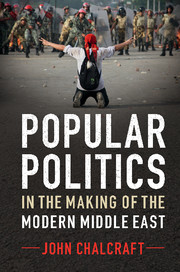Book contents
- Frontmatter
- Dedication
- Contents
- List of maps
- Preface and acknowledgements
- Introduction
- I Millenarianism, renewal, justice, rights and reform, 1798–1914
- II Patriotism, liberalism, armed struggle and ideology, 1914–1952
- III National independence, guerrilla war and social revolution, 1952–1976
- IV Islamism, revolution, uprisings and liberalism, 1977–2011
- Conclusion
- References
- Index
Conclusion
Published online by Cambridge University Press: 05 March 2016
- Frontmatter
- Dedication
- Contents
- List of maps
- Preface and acknowledgements
- Introduction
- I Millenarianism, renewal, justice, rights and reform, 1798–1914
- II Patriotism, liberalism, armed struggle and ideology, 1914–1952
- III National independence, guerrilla war and social revolution, 1952–1976
- IV Islamism, revolution, uprisings and liberalism, 1977–2011
- Conclusion
- References
- Index
Summary
This book has aimed to demonstrate that the history of the Middle East and North Africa since the eighteenth century cannot be understood without paying attention to the role played by contentious mobilization. From the uprising in Ottoman Egypt against the French occupation of 1798–1801 to the Arab uprisings of 2011, a wide variety of mobilizing projects have reinforced fragile or brought into being new collective actors and thereby weighed heavily in the region's political dynamics and settlements. This history cannot be captured by solely top-down or power-institutional accounts.
The first part of the book argued that the long crisis of the dynastic and Islamic state from 1798 to 1914 cannot be understood without taking into account a wide variety of revolutionary, reformist, autonomist and defensive mobilizing projects. Such movements were sometimes able to carve out spheres of autonomy and to promote forms of justice and equality in the operations of the political order – at least in certain times and places. Sufi orders and tribal notables kept the French at bay in many ways in Algeria. Or, petitioners and mobilization around elections for village and guild heads in Egypt in the 1870s were sometimes successful, and deepened these sites of articulation at least until the period of British rule, which dismantled them. Weapons of the weak could blunt the force of the burdens imposed by the centralizing states. Reformists established the principle of representation in the state on at least three occasions – in Egypt during 1881–2, in Iran in 1905 and in Istanbul in 1908 – although on each occasion the effort was knocked back. Revolutionaries under the banners of Islam brought two new states into being, one in Sudan, the other in Arabia, while Abd Al-Qadir in Algeria and Al-Hiba in Morocco also brought temporary, new forms of statehood. In all cases, though, these new states were either destroyed, or accommodated themselves with imperialism.
The crisis of the Alawi, Ottoman and Qajar states was not brought about solely by European pressure or the activities of the dominant bloc. One of the most important contributions that mobilizing projects made to this crisis was unintended: they regularly acted to provide the pretext for, and even more actively to draw in European imperial intervention from outside.
- Type
- Chapter
- Information
- Popular Politics in the Making of the Modern Middle East , pp. 529 - 551Publisher: Cambridge University PressPrint publication year: 2016



